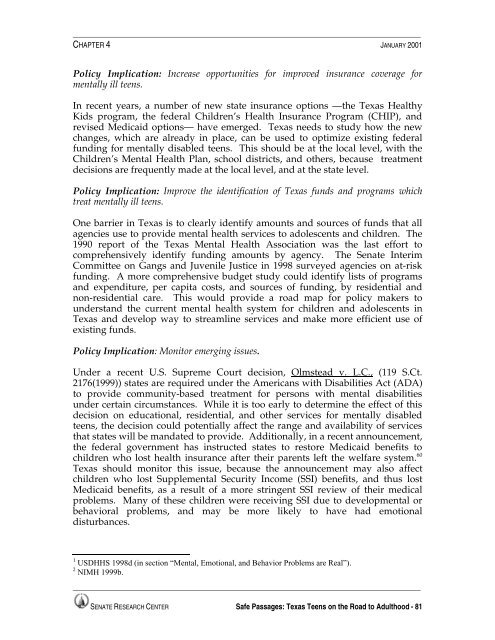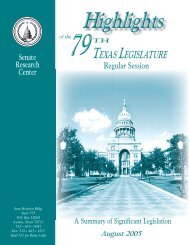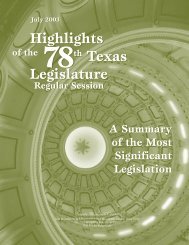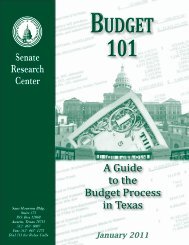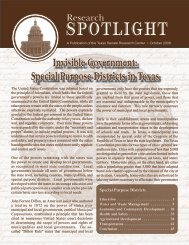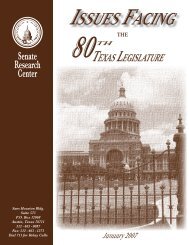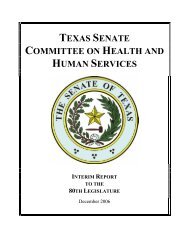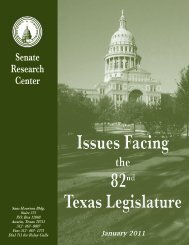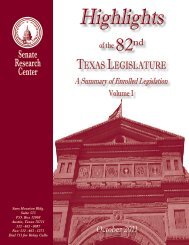Texas Teens Cover - Senate
Texas Teens Cover - Senate
Texas Teens Cover - Senate
Create successful ePaper yourself
Turn your PDF publications into a flip-book with our unique Google optimized e-Paper software.
______________________________________________________________________________________<br />
CHAPTER 4 JANUARY 2001<br />
Policy Implication: Increase opportunities for improved insurance coverage for<br />
mentally ill teens.<br />
In recent years, a number of new state insurance options —the <strong>Texas</strong> Healthy<br />
Kids program, the federal Children’s Health Insurance Program (CHIP), and<br />
revised Medicaid options— have emerged. <strong>Texas</strong> needs to study how the new<br />
changes, which are already in place, can be used to optimize existing federal<br />
funding for mentally disabled teens. This should be at the local level, with the<br />
Children’s Mental Health Plan, school districts, and others, because treatment<br />
decisions are frequently made at the local level, and at the state level.<br />
Policy Implication: Improve the identification of <strong>Texas</strong> funds and programs which<br />
treat mentally ill teens.<br />
One barrier in <strong>Texas</strong> is to clearly identify amounts and sources of funds that all<br />
agencies use to provide mental health services to adolescents and children. The<br />
1990 report of the <strong>Texas</strong> Mental Health Association was the last effort to<br />
comprehensively identify funding amounts by agency. The <strong>Senate</strong> Interim<br />
Committee on Gangs and Juvenile Justice in 1998 surveyed agencies on at-risk<br />
funding. A more comprehensive budget study could identify lists of programs<br />
and expenditure, per capita costs, and sources of funding, by residential and<br />
non-residential care. This would provide a road map for policy makers to<br />
understand the current mental health system for children and adolescents in<br />
<strong>Texas</strong> and develop way to streamline services and make more efficient use of<br />
existing funds.<br />
Policy Implication: Monitor emerging issues.<br />
Under a recent U.S. Supreme Court decision, Olmstead v. L.C., (119 S.Ct.<br />
2176(1999)) states are required under the Americans with Disabilities Act (ADA)<br />
to provide community-based treatment for persons with mental disabilities<br />
under certain circumstances. While it is too early to determine the effect of this<br />
decision on educational, residential, and other services for mentally disabled<br />
teens, the decision could potentially affect the range and availability of services<br />
that states will be mandated to provide. Additionally, in a recent announcement,<br />
the federal government has instructed states to restore Medicaid benefits to<br />
children who lost health insurance after their parents left the welfare system. 60<br />
<strong>Texas</strong> should monitor this issue, because the announcement may also affect<br />
children who lost Supplemental Security Income (SSI) benefits, and thus lost<br />
Medicaid benefits, as a result of a more stringent SSI review of their medical<br />
problems. Many of these children were receiving SSI due to developmental or<br />
behavioral problems, and may be more likely to have had emotional<br />
disturbances.<br />
1 USDHHS 1998d (in section “Mental, Emotional, and Behavior Problems are Real”).<br />
2 NIMH 1999b.<br />
______________________________________________________________________________________<br />
SENATE RESEARCH CENTER Safe Passages: <strong>Texas</strong> <strong>Teens</strong> on the Road to Adulthood - 81


